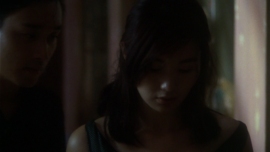Leslie Cheung was a phantom.
Wong Kar-wai, his best director, and powerhouse generator of a 1990s-era cinephilia, realised this early on. He gave Cheung the most precious gift any director can give an actor: a cinematic form, an incarnation in light, shadow and movement – an embodiment triangulated between the gestures of the actor, the displacements of the camera and the dynamism of the edits.
Although, in Cheung’s case, it was more a disembodiment, a dispossession of his sweet self.
Cheung was born, to cinema, as a fugitive, forever fleeing the frame, merging with the dark, freezing and fading on a striking pose or a sudden, piercing glance.
In the pre-title scene of Days of Being Wild (1990), Wong conjures this phantom in ten, sinuous shots. Shots most often linked via odd transitions, tiny ellipses, strange moves in the space.
The camera tracks him from behind as he barrels in cockily, turning a corner and besieging a coke freezer. We see him more from the back from the front: sure sign of mystery.
He rolls himself lazily into a few shots, always languorously propping himself up, in mid-air somehow, for support.
He seems to be floating, or gliding on moving panels, more than simply walking or serenely standing.
He surprisingly slips into what we assumed to be his own field of vision; and slips out, just as unexpectedly.
Finally, he is only a sound: the footsteps that approach, that recede.
Beside him, Maggie Cheung is the figure of solidity: well-lit, well seen, hands in the cash register, stacking the crates.
Leslie is the master of the agonising, bewitching dance of possible seduction inaugurated in this scene. He has magic powers; he has already divined her name without her telling him this.
But, alas, he is also scarcely there: even the VHS cover on the old copy I once had calls him ‘a man desperately seeking his own identity’.
And the rest of the film will show us what extremes this phantom is capable of: languid alienation (happiness lasts only one minute) alternating with explosions of violence – and always, like for Bugsy Siegel the gangster in the Warren Beatty/James Toback movie, that narcissistic grooming in the mirror, as if to reassure himself that, after all, he exists, that he has somewhere to go, an origin and a goal.

But it is hard to be oneself in a Wong film: all his men and all his women look so alike, and their roles and functions and plotlines blur and merge so easily, so inevitably.
Better to be a phantom.
What does Leslie say as he sweeps out of this fragment of a scene, before the camera turns a little and Maggie looks, fixatedly, in his fuzzy direction of departure? ‘You’ll see me tonight in your dreams’.
© Adrian Martin September 2003 / July 2014